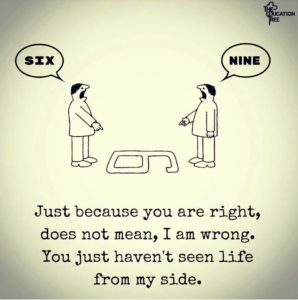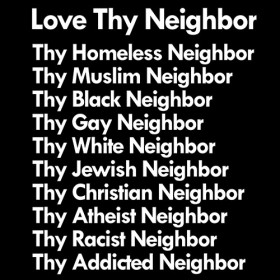I was raised as a fundamentalist Christian. People who don’t live in this bubble have no idea how much power such an ideology carries. In this way of thinking, there is this deep conviction that we must be RIGHT. Being wrong meant judgment, shame and a hell of a lot worse consequences. We Fundamentalists had to be right and that meant anyone who disagreed with us must be wrong.
Again – if you haven’t been there, you have no idea and I get that so, please keep reading and hear me out. I’m mostly writing this for my Christian Right friends but I’m hoping my Secular Left friends might also find some new insights. And even my Christian Left friends. And maybe some renewed compassion for- and from – all of us
Right and Wrong are interesting categories. They are appropriate descriptions in some fields, but even mathematics reminds us how broad truth can be. 2+2=4 but also 3+1 and 12-8. Right can be right in a variety of ways.
When we function within more subjective categories like philosophy or theology, right and wrong almost lose their meaning. Beliefs, doctrines and dogmas express something about our human experience rather than naming any sort of empirical reality.
Throughout history, humans have misused these subjective constructions as foundations, as eternal truths true for all people in all times. Ideology then becomes a basis for relationship and our beliefs define who is in and who is out, who is right and who is wrong.
If I am right, you must be wrong.
If my beliefs are orthodox, your beliefs must be heresy.
This black and white, dualistic thinking has plagued us since our human beginnings and has been a source of many of our human conflicts.
Of course such thinking did not originate with the modern American Fundamentalist and Evangelical community, but I think today’s Evangelicals have been infected with a particular kind of feverish black and white purity. The topic of abortion, for example, cannot consist of any grey areas; there can only be one narrow right perspective for some of these people. Their passion blinds them to the equal passion other people feel about the health and welfare of women and families.
Because we are complex human beings, our human issues are ever complex and multifaceted. Labels of right and wrong are unhelpful and even unhealthy. Instead of “if I’m right, you must be wrong” thinking, let’s venture more “I truly believe I’m right but I admit I could also be a little bit wrong. Tell me why you believe you are right. I’m curious.”
“Ortho-doxy” means “right thinking, right doctrine, right belief.” Since I grew up with an obligation to orthodoxy, I understand its powerful pull. But as I have learned more and grown on my spiritual journey, I have come to understand that ortho-praxis carries more weight in all my various human relationships. AND (I will argue) in my relationship with God.
Right practice matters more than right belief.
Throughout our Christian Scripture, the overwhelming call is to DO and to BE, not to think or simply believe.
To act like Christ, to become more and more like Christ.
To live lives marked by love, joy, peace, patience, kindness, goodness, faithfulness, gentleness and self-control. Like Jesus.
To feed the hungry and clothe the naked and welcome the stranger and protect widows and orphans. Like Jesus.
Right practice matters more than right belief.
Therefore this is my plea to my Evangelical friends: when you look at the rest of us Christians, please measure us according to the life of Jesus, not according to your own particular orthodoxy. “Heretic” (as some would label us) smacks of judgment and does not invite relationship.
When you evaluate the practice and policies of politicians, consider how they measure up to the divine call to lead with wisdom and to practice justice for “the least of these.”
And when you judge your own faithfulness, please step outside your bubble and try to see yourselves as others see you. This is hard and even painful but it is also painfully true that many people reject Christ because of the Christianity so many of us practice so poorly.
We all need to ask ourselves: What do our lives say about the One we claim to follow? What do others see in us: authenticity or self-deception? Welcome or rejection? Love or judgment?
The power of the gospel is that we do not need to be right; we only need to be true. True to the call to love our neighbors as ourselves.
Our “Samaritan” neighbors.  Our gay and trans neighbors. Our “Red and Yellow, Black and White” neighbors. The neighbors to the left of us or to the right of us or to the south of us. The neighbors who read the Bible differently or don’t read the Bible at all. Even our “enemy” neighbors.
Our gay and trans neighbors. Our “Red and Yellow, Black and White” neighbors. The neighbors to the left of us or to the right of us or to the south of us. The neighbors who read the Bible differently or don’t read the Bible at all. Even our “enemy” neighbors.
To love others as God loves us – generously, lavishly, unconditionally.
To love others as God loves us – with practical, physical acts of goodness, kindness and compassion.
To love all others, not just some others.
The “fundamentals” of faith are not beliefs or creeds or propositions. The fundamental life of faith is what Jesus says it is: Love God with heart, soul, mind and strength. And the other “like unto it” – love the neighbor as we love ourselves. Every fundamental law, rule and commandment is summed up right here: in the core fundamental of love.
This is the only “right” that matters.
See Charlotte’s companion blog: When the Right is Always Wrong and the Left is Always Right.
Your message resonates for me deeply. I was raised in fundamentalist beliefs. Somewhere along the way i realized it simply didn’t work for me. But i didn’t know how to separate that from making my parents wrong for believing it. Plus as a young person i did not have the confidence to stand up and say no. So i pushed all feelings down, hung my head and shut down. To add to that, i believed that if i was depressed, then i wasn’t right with God, cause God could make everything okay, so it was my fault. I’ve worked years to work through this and it is so so so deep and shaped my foundation……………. it still shows up. Thanks so much for your piece. That black and white world is so tragic for children, it breaks my heart.
You say much here that resonates with me, Sharon. My journey was long and convoluted as well (I very much am still on that journey!) for a long time, I found it really difficult to remember anything good about my past or to think kindly about people who still thought in the “old way.” Mostly now I manage patience and compassion for those who live such small black-and-white lives. But I carry a deep anger toward those who use and manipulate these conservatives. Like many in this administration and in this American Evangelical church. But then again, I think they are using each other, each for their own purposes. Breaks my heart too. Thanks for reading and thanks for the conversation. Peace!
Jesus said in John 8:58; “Before Abraham was I am.” ‘I am’ in Hebrew is ‘Yahweh’.
Moses & Jesus said in Deut. 6:5, Mathew 22:37, and Mark 12:30, “Love the Lord your God with ALL your heart and with ALL your mind and with ALL your soul and with ALL your strength.”
And Jesus said in John 14:6, “I am the way, the truth, and the life; no man (or woman) comes unto the Father (God) but by me (Jesus).
The only way to God is to ask forgiveness of our sins and invite Jesus into our hearts. See Acts 2:37-39
This is what Christianity is all about.
Thanks Sally. Of course we will love these same powerful scriptures. One way that my understanding has shifted over the years, however, is that I see “the only way to get to God” differently. I used to think that work depended on me; now I know God has already accomplished that work in Jesus the Christ. My part is to be ever open to Spirit’s ongoing work of transformation. What Christianity is all about is the gospel: the good news that the God Who is Love loves each and every one of us absolutely and forever. There is nothing we can do to make God love us more. Or to love us less. Really really good news. Thanks for reading and thanks for the conversation. Peace.
Your article was so comforting to read. I don’t know how much of it a far right individual could get through, but I hope a little more with each attempt. As I attempted to respond, I was reminded I also benefit from the principals you espouse in my dealings with my far right friends.
Yes, we all keep trying. To speak well and to listen deeply. Thanks for reading Andy and thanks for the conversation. Peace.
Would like you to send to Paris News for publishing as guest columnist.
Thanks Gary. Let me think about it. I really appreciate your suggestion. Peace.
Thanks, for your sensitivity to the small points! Sometimes they can loom into a LARGE point, can’t they? Again, what a good, solid article! Thanks for your reply and your love for our Lord!
Janice
First, and most importantly, this is an EXCELLENT article. As a formerly strict fundamentalist, I understand of what you speak. The only place where I get a bit uncomfortable is when you say, “I’m mostly writing this for my Christian Right friends but I’m hoping my Secular Left friends might also find some new insights.” Some people say one cannot be a liberal leftist and be a Christian. All I want to point out is my opinion is that when we say “Secular Left” is seems we sort of “smack” at there being no “Christian Left.” I lean pretty far left, and Jesus is my Savior and Lord. Taking it one step further, when we give fundamentalists a good “once over” it just could be that we might find a bit of secularism THERE as well. Hum?
Again, my opinion. Thanks for the opportunity to post here!
Janice
Excellent point Janice. I will edit this blog appropriately. I was thinking about some of the people on the secular left who have engaged me in cyberspace conversation recently. It fascinates me how fundamentalist an atheist can be. I keep hoping for more compassion all round. Thanks for reading and for commenting. I really appreciate you. Peace.